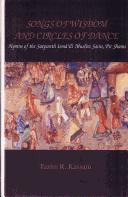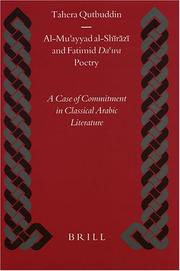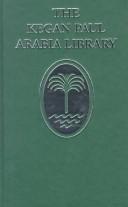| Listing 1 - 9 of 9 |
Sort by
|
Book
ISBN: 1136840915 1280682736 1136840923 9786613659675 0203833104 9781136840920 9780415608503 9780203833100 9781280682735 6613659673 9780203833100 9781136840913 Year: 2011 Publisher: London New York Routledge
Abstract | Keywords | Export | Availability | Bookmark
 Loading...
Loading...Choose an application
- Reference Manager
- EndNote
- RefWorks (Direct export to RefWorks)
This volume contains thirty-five translations of Persian poetry, arranged in five groups as well as two examples of prose translations from Arabic, which offer examples of 'rhymed prose' of which the earliest examples are to be found in the Koran. To help the reader, a substantial introduction on Persian poetry is included, as well as a personal memoir of the author by J B Atkins.
Book
ISBN: 0300235569 0300225814 Year: 2018 Publisher: New Haven, CT : Yale University Press,
Abstract | Keywords | Export | Availability | Bookmark
 Loading...
Loading...Choose an application
- Reference Manager
- EndNote
- RefWorks (Direct export to RefWorks)
This stunning collection showcases the love poetry and mystical teachings at the heart of the Islamic tradition in accurate and poetic original translations At a time when the association of Islam with violence dominates headlines, this beautiful collection offers us a chance to see a radically different face of the Islamic tradition. It traces a soaring, poetic, popular tradition that celebrates love for both humanity and the Divine as the ultimate path leading humanity back to God. Safi brings together for the first time the passages of the Qur'an sought by the Muslim sages, the mystical sayings of the Prophet, and the teachings of the path of "Divine love." Accurately and sensitively translated by leading scholar of Islam Omid Safi, the writings of Jalal al†'Din Rumi can now be read alongside passages by Kharaqani, 'Attar, Hafez of Shiraz, Abu Sa'id†'e Abi 'l†'Khayr, and other key Muslim mystics. For the millions of readers whose lives have been touched by Rumi's poetry, here is a chance to see the Arabic and Persian traditions that produced him.
Islamic poetry. --- Islam --- Islamic literature --- Religious poetry

ISBN: 0585045925 9780585045924 0791425916 0791425924 1438408412 Year: 1995 Publisher: Albany State University of New York Press
Abstract | Keywords | Export | Availability | Bookmark
 Loading...
Loading...Choose an application
- Reference Manager
- EndNote
- RefWorks (Direct export to RefWorks)
Coursing through cultures and time, tuneful verse has given moving expression to the human longing for the divine. As poetry strung on sweet melodies, hymns bear testimony to the religious life of the devout, and to the inspiring teachings of minstrels and saints. Such is the ginan tradition of the Satpanth Ismailis, Indian successors of the Fatimid and Nizari Ismaili sect of the Shiah Muslims. Traditionally recited during daily ritual prayers, ginans have been revered for generations among the Satpanth Ismailis as sacred compositions. This work offers for the first time an extensive translation of hymns attributed to the Ismaili saint-composer, Pir Shams (ca. 13th century), who is at once one of the most pivotal and yet most enigmatic figures of this literary tradition.
Islamic poetry, Indic --- Ismaili literature --- Arabic literature --- Islamic literature --- Persian literature --- Indic Islamic poetry --- Indic poetry --- Translations into English.
Book
ISBN: 9004365958 9004362886 9789004365957 9789004362888 Year: 2018 Publisher: Leiden Boston
Abstract | Keywords | Export | Availability | Bookmark
 Loading...
Loading...Choose an application
- Reference Manager
- EndNote
- RefWorks (Direct export to RefWorks)
This book presents fifty-one didactic and devotional Sufi poems (with English translations) composed by the ulama of Brava, on Somalia’s Benadir coast, in Chimiini, a Bantu language related to Swahili and unique to the town. Because the six ulama-poets, among whom two women, guided local believers towards correct beliefs and behaviours in reference to specific authoritative religious texts, the poems allow insight into their authors’ religious education, affiliations, in which the Qādiriyyah and Aḥmadiyyah took pride of place, and regional connections. Because the poems refer to local people, places, events, and livelihoods, they also bring into view the uniquely local dimension of Islam in this small East African port city in this time-period.
Sufi poetry. --- Mwini dialect. --- Af-Chimwiini dialect --- Barwaani dialect --- Bravanese dialect --- Chimwiini dialect --- Mwiini dialect --- Swahili language --- Sufism --- Islamic poetry --- Religious poetry --- Sufi literature --- Baraawe (Somalia) --- Brava (Somalia)

ISBN: 9004141030 9786610867172 9047406362 1280867175 1433704161 9789047406365 9781433704161 9789004141032 Year: 2005 Volume: v. 57 Publisher: Leiden Boston Brill
Abstract | Keywords | Export | Availability | Bookmark
 Loading...
Loading...Choose an application
- Reference Manager
- EndNote
- RefWorks (Direct export to RefWorks)
This study analyzes the committed religio-political poetry of al-Mu'ayyad al-Shirazi, chief missionary for the Fatimids in the fifth/eleventh century, demonstrating his founding of the tradition of ''Fatimid da'wa (religious mission) poetry" that has flourished after him for a thousand years.
Islamic poetry, Arabic --- History and criticism. --- Muʼayyad fī al-Dīn Hibat Allāh ibn Mūsá, --- Criticism and interpretation. --- Poetry, Arabic --- Poésie arabe --- Histoire et critique --- Muʼayyad fī al-Dīn Hibat Allāh ibn Mūsá, --- History and criticism --- Hibat Allāh ibn Mūsá, Muʼayyad fī al-Dīn, --- Ibn Mūsá, Muʼayyad fī al-Dīn Hibat Allāh, --- Muʼayyad fī al-Dīn Hibat Allāh Mūsá al-Shīrāzī, --- Shīrāzī, Muʼayyad fī al-Dīn Hibat Allāh Mūsá, --- مؤيد في الدين هبة الله بن موس، --- مؤيد في الدين هبة الله بن موسى --- مؤيد في الدين هبة الله بن موسى، --- Islamic poetry [Arabic ] --- Muayyad fi al-Din Hibat Allah ibn Musa,
Book
ISBN: 0520298012 0520970144 9780520970144 Year: 2018 Publisher: Oakland University of California Press
Abstract | Keywords | Export | Availability | Bookmark
 Loading...
Loading...Choose an application
- Reference Manager
- EndNote
- RefWorks (Direct export to RefWorks)
"In the Arabic eleventh century, scholars were intensely preoccupied with the way that language generated truth and beauty. Their work in poetics, logic, theology, and lexicography defined the intellectual space between God and the poets. In Language Between God and the Poets, Alexander Key argues that ar-Raghib al-Isfahani, Ibn Furak, Ibn Sina (Avicenna), and Abd al-Qahir al-Jurjani shared a conceptual vocabulary based around the words ma'na and haqiqah. They used this vocabulary to build theories of language, mind, and reality that answered perennial questions: how to structure language and reference, how to describe God, how to construct logical arguments, and how to explain poetic affect."--Provided by publisher
Literary studies: classical, early & medieval --- Early history: c 500 to c 1450/1500 --- Philosophy --- Islam --- Islamic philosophy --- Islamic poetry --- Arabic language --- Religious aspects --- Islam. --- Islamic literature --- Arabic philosophy --- Muslim philosophy --- Philosophy, Islamic --- Philosophy, Arab --- abd al qahir al jurjani. --- answers. --- ar raghib al isfahani. --- arabic. --- avicenna. --- beauty. --- conceptual vocabulary. --- describing god. --- eleventh century. --- god. --- haquqah. --- ibn furak. --- ibn sina. --- intellectual space. --- language and reference. --- language. --- lexicography. --- logic. --- logical arguments. --- ma na. --- mind. --- muslim. --- perennial questions. --- poetic affect. --- poetics. --- poets. --- reality. --- religion. --- scholars. --- theology. --- theories of language. --- truth. --- Religious poetry
Book
ISBN: 9780520298712 0520298713 0520970764 9780520970762 Year: 2018 Publisher: Oakland, California : University of California Press,
Abstract | Keywords | Export | Availability | Bookmark
 Loading...
Loading...Choose an application
- Reference Manager
- EndNote
- RefWorks (Direct export to RefWorks)
"Sounding Islam investigates the sonic dimensions of religion, combining perspectives from the anthropology of media, the anthropology of semiotic mediation, and sound studies. Based on long-term ethnographic research on devotional Islam in Mauritius, Patrick Eisenlohr explores how the voice, as a site of divine manifestation, becomes refracted in media practices that have become integral parts of religion. At the core of Eisenlohr's concern is the interplay of voice, media, affect, and listeners' experience, especially within the context of Mauritian Islamic practices. The work is a contribution to the anthropological study of sound, media, and religious experience and a rich study of Mauritius, diasporic South Asian communities, and global Islam."--Provided by publisher.
Islam --- Islam. --- Islamic poetry. --- Sound --- Voice. --- Religious aspects --- Mauritius. --- Religion: general --- Media studies --- Anthropology --- Mohammedanism --- Muhammadanism --- Muslimism --- Mussulmanism --- Religions --- Muslims --- Islamic literature --- Speaking --- Human sounds --- Language and languages --- Music --- Throat --- Diaphragm --- Elocution --- Larynx --- Speech --- Physiological aspects --- affect. --- anthropology of media. --- devotional islam. --- dimension of religion. --- divine manifestation. --- ethnographic research. --- history of islam. --- interplay of voice. --- islam. --- islamic rituals and practice. --- mauritius. --- media practices. --- media. --- muslim. --- neo phenomenological. --- religion. --- religious experiences. --- religious traditions. --- sonic dimensions. --- sonic incitement of sensations. --- sound studies. --- translations. --- voice. --- Religious poetry

ISBN: 020303905X 1136171789 9781136171789 9780203039052 0710305788 9780710305787 9781136171864 9781136171932 9780415760157 113617186X Year: 2013 Publisher: Hoboken London New York Taylor and Francis Routledge, Taylor & Francis Group
Abstract | Keywords | Export | Availability | Bookmark
 Loading...
Loading...Choose an application
- Reference Manager
- EndNote
- RefWorks (Direct export to RefWorks)
First published in 1998. Routledge is an imprint of Taylor & Francis, an informa company.
Sufism. --- Sufi poetry --- Sufism --- Islamic poetry --- Religious poetry --- Sufi literature --- Sofism --- Mysticism --- History and criticism. --- Islam --- Abu Sa'id ibn Abi 'l-Khair (Fazl Ullah), --- 'Abd al-Karim ibn Ibrahim. --- 'Umar ibn Ali, called Ibn al-Farid, --- Abū Saʻīd ibn Abī al-Khayr, --- Jīlī, ʻAbd al-Karīm ibn Ibrāhīm, --- ʻAbd al-Karīm al-Jīlī, --- ʻAbd al-Karīm ibn Ibrāhīm al-Jīlānī, --- ʻAbd al-Karīm ibn Ibrāhīm al-Kīlānī, --- Abdüʼl-kerı̂m bin İbrahim el-Cı̂lı̂, --- Abdülkerim Cı̂ylî, --- Cı̂lı̂, Abdüʼl-kerı̂m bin İbrahim, --- Cı̂ylı̂, Abdülkerim, --- Ǧīlī, ʻAbd al-Karīm, --- Jīlānī, ʻAbd al-Karīm ibn Ibrāhīm, --- Jīlī, ʻAbd al-Karīm, --- Kīlānī, ʻAbd al-Karīm ibn Ibrāhīm, --- جيلي ، عبد الكريم بن إبراهيم --- جيلي، عبد الكريم بن إبراهيم، --- جيلى، عبد الكريم --- عبد الكريم بن ابراهيم الجيلي --- Shaykh Abī Saʻīd, --- Abū Saʻīd Abū al-Khayr, --- Abū Saʻīd Faz̤l Allāh ibn Abū al-Khayr, --- Abū Saʻīd-i Abū l-Ḫayr, --- Sheikh Abu-Saeed Abil-Kheir, --- Abu-Saeed Abil-Kheir, --- Abu Sakhyt Abul Khaĭr, --- Abusaid Abulʹkheĭr, --- Fazullakh ibn Akhmed ibn Mukhammed ibn Ibragim Mikhni, --- Babu Abulkheĭr, --- Abulkhaĭr Baba, --- Abu Seĭt Abulkhaĭr, --- Fazlulla ibn Akhmet ibn Mukhammet ibn Ybraĭym Măneli, --- Abu Said Abi'l-Khair, --- Abulkhair, Abusaʼid, --- Abusaʼid Abulkhair, --- Abu Sa'id Abu'l Kheyr, --- Ebû Saîd-i Ebü'l-Hayr, --- ابو سعيد ابو الخير --- ابو سعيد ابوالخير --- ابو سعيد بن ابي الخير --- ابو سعيد بن ابي الخير، --- ابوسعيد بن ابى الخير --- Ibn al-Fāriḍ, ʻUmar ibn ʻAlī, --- al-Fāriḍ, ʻUmar b., --- Fāriḍ, ʻUmar b. al-, --- Ḥamawī, ʻUmar ibn ʻAlī, --- Ibn al-Fâridh, 'Omar, --- İbn Farız, --- Ibn Fāriz̤, ʻUmar ibn ʻAlī, --- Miṣrī, ʻUmar ibn ʻAlī, --- ʻUmar b. al-Fāriḍ, --- ʻUmar ibn ʻAlī al-Ḥamawī, --- ʻUmar ibn ʻAlī al-Miṣrī, --- ʻUmar ibn ʻAlī ibn al-Fāriḍ, --- ابن الفارض --- ابن الفارض، عمر بن علي --- ابن الفارض، عمر بن علي، --- ابن الفارض، عمر بن على، --- ابن الفريد، عمر بن علي --- ابن الفريض، عومر --- ابن الفريض، عمر بن على --- ابن فارض، عمر بن على,
Book
ISBN: 9789004431294 9004431292 9004377557 Year: 2020 Publisher: Brill
Abstract | Keywords | Export | Availability | Bookmark
 Loading...
Loading...Choose an application
- Reference Manager
- EndNote
- RefWorks (Direct export to RefWorks)
The Journeys of a Taymiyyan Sufi examines the life and doctrine of ʿImād al-Dīn Aḥmad al-Wāsiṭī (d. 711/1311), a little-known Ḥanbalī Sufi master from the circle of Ibn Taymiyya (d. 728/1328). The first part of this book follows al-Wāsiṭī’s physical journey in search of spiritual guidance through a critical study of his autobiographical writings. This provides unique insights into several important manifestations of Sufism that he encountered as he travelled from Wāsiṭ to Baghdad, Alexandria, Cairo, and finally, Damascus. The second part focuses on his spiritual journey through a study of his Sufi writings, which convey a distinct type of Sufism that was specifically formulated within the boundaries of traditionalist theology as he understood it.
Sufis --- Sufism --- Doctrines --- Wāsiṭī, Aḥmad ibn Ibrāhīm, --- Ibn Taymīyah, Aḥmad ibn ʻAbd al-Ḥalīm, --- Ibn al-ʻArabī, --- Aḥmad ibn ʻAbd al-Ḥalīm ibn Taymīyah, --- Ḥarrānī, Aḥmad ibn ʻAbd al-Ḥalīm, --- Ibn Taymīyah, Taqī al-Dīn, --- Taqijuddin Ibnu Taimyah, --- Aḥmad ibn ʻAbd al-Ḥalīm al-Ḥarrānī, --- Taqī al-Dīn ibn Taymīyah, --- Ibnu Taimiyah, Taqijuddin, --- Ibn Taymīyah, --- Taqi al-Din Ahmad ibn Taymiyya, --- Ibn Taymiyya, Taqi al-Din Ahmad, --- Ibn Taymiyya, --- Ibn Taimiyyah, --- Ibn Taymiyyah, --- Ibn Taimiyah, --- Ibn-i Taimīyah, --- Ibn-e-Taimiya, --- Ibne Taimiyah, --- أبن تيميه، أحمد بن عبدالحليم --- أبي العباس تقي الدين أحمد بن عبد الحايم ابن تيمية الحراني --- أحمد بن تيمية --- أحمد بن عبد الحليم --- أحمد بن عبد الحليم ابن تيمية، --- أحمد بن عبد الحليم بن تيمية --- إبن تيمية، احمد بن عبد الحليم --- إبن تيمية، احمد عبد الحليم --- إبن تيميه، أحمد بن عبد الحليم --- ابن تمية، أحمد بن عبد الحليم --- ابن تيمية، أحمد --- ابن تيمية، أحمد ابن عبد الحليم، --- ابن تيمية، أحمد بن عبد الحليم بن عبد السلام --- ابن تيمية، أحمد بن عبد الحليم، --- ابن تيمية، أحمد عبد الحليم، --- ابن تيمية، احمد ابن عبدالحليم، --- ابن تيمية، احمد بن عبد الحليم، --- ابن تيمية، محمد بن عبد الحليم --- ابن تيميه، أحمد بن عبد الحليم، --- ابن تيميه، احمدابن عبدالحليم --- بن تيمية، أحمد ابن عبد الحليم، --- بن تيمية، أحمد بن الحليم، --- بن تيمية، أحمد بن عبد الحليم، --- بن تيمية، احمد بن عبد الحليم، --- تقي الدين أبي العباس أحمد بن تيمية --- تقي الدين أحمد بن تيمية --- تقي الدين أحمد بن عبد الحليم بن تيمية --- تقي الدين ابو العباس احمد بن عبد الحليم بن تيمية --- Ibn-i Taimiyah al-Ḥarānī, Aḥmad bin ʻAbdulḥalīm, --- ابن تيميه الحرانى، احمد بن عبد الحليم، --- ابن تيميه، --- Wāsiṭī, ʻImād al-Dīn Aḥmad ibn Ibrāhīm, --- Ḥazzāmī, Aḥmad ibn Ibrāhīm, --- Aḥmad ibn Ibrāhīm al-Wāsiṭī, --- Ibn Shaykh al-Ḥazzāmīn, Aḥmad ibn Ibrāhīm, --- واسطي، أحمد بن إبراهيم --- واسطي، احمد بن ابراهيم, --- Andalusi, Mehmet bin Ali, --- Ibn al-ʻArabī, Muḥyī al-Dīn Muḥammad ibn ʻAlī, --- Ibn ʻArabî, --- Ibn ʻArabi, Mohyiddin, --- İbn Arabî, Muhittin, --- Ibn ʻArabī, Muḥyī al-Dīn Muḥammad ibn ʻAlī, --- Ibn ʻArabī, Muḥyiddīn, --- Ibn-i ʻArabī, Muḥīuddīn Muḥammad bin ʻAlī T̤āʼī Undlusī ibn-i ʻArabī --- Ibn Surāqah, --- İbnʼül-arabî, Muhyiddîn, --- Magribi, Mehmet bin Ali, --- Mohyiddin ibn ʻArabi, --- Muḥammad bin ʻAlī T̤āʼī Undlusī ibn-i ʻArabī, Muḥīuddīn, --- Muḥammad ibn ʻAlī, Muḥyī al-Dīn ibn al-ʻArabī, --- Muhittin i̇bn Arabî, --- Muḥīuddīn Muḥammad bin ʻAlī T̤āʼī Undlusī ibn-i ʻArabī, --- Muhiy al Din ibn Arabi, --- Muḥyī al-Dīn ibn ʻArabī, --- Muḥyī al-Dīn Muḥammad ibn ʻAlī ibn al-ʻArabī, --- Muḥyī al-Dīn Muḥammad ibn ʻAlī ibn ʻArabī, --- Muḥyiddīn ibn ʻArabī, --- Muhyiddîn İbnʼül-arabî, --- Raʼīs al-Ṣūfīyah, --- Şeyh-i ekberi, --- Shaykh al-Akbar, --- Taʼi, Mehmet bin Ali, --- T̤āʼī Undlusī ibn-i ʻArabī, Muḥīuddīn Muḥammad bin ʻAlī, --- Undlusī ibn-i ʻArabī, Muḥīuddīn Muḥammad bin ʻAlī T̤āʼī, --- Ibnu Arabi, Muhyiddin, --- ابن العربي، --- ابن عربي --- ابن عربي، --- بن العربي --- لإبن العربي، --- محيى الدين بن عربي --- Teachings. --- Mysticism --- Sufism. --- Sufi poetry. --- Islam. --- Sofism --- Islamic poetry --- Religious poetry --- Sufi literature --- Islam --- Sufi --- ʿImād al-Dīn Aḥmad al-Wāsiṭī --- Religion --- ابن تيميه الحرانى، احمد بن عبد الحليم، --- ابن تيميه،
| Listing 1 - 9 of 9 |
Sort by
|

 Search
Search Feedback
Feedback About UniCat
About UniCat  Help
Help News
News